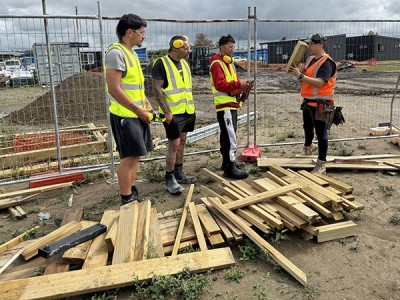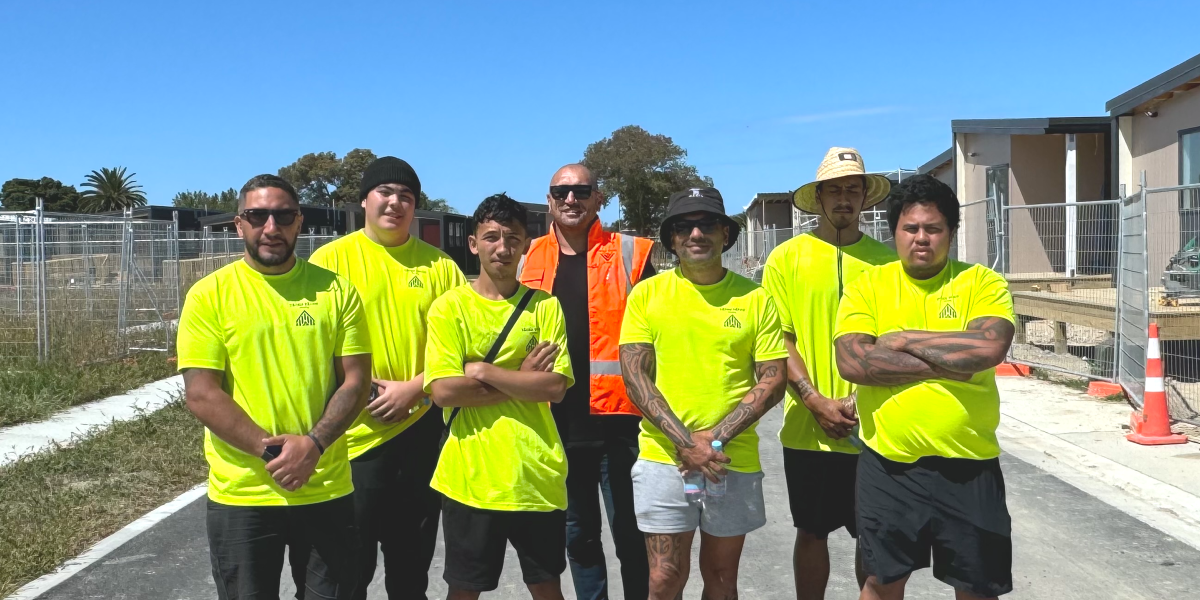Te Ara Tipu: Growing futures in Wairoa’s construction industry
The first cohort of the Te Ara Tipu programme has wrapped up with positive results, providing a practical step forward in developing a skilled local workforce in Wairoa. Designed as a pre-employment training initiative, Te Ara Tipu is equipping locals with the practical experience, confidence, and connections to step into opportunities within Wairoa’s construction sector.
Launched in February 2025, the two-week programme is led in partnership and funded by the Ministry of Social Development’s Jobs and Skills Hub based in Hawke’s Bay, a unique branch that focuses solely on infrastructure and construction. Rani Morunga, who leads the Hub, says it’s all about local connection:
“Part of our role is to identify what big projects are happening in the region, talk to employers, and see what skills and people they need,” says Rani. “We’re here to build a pipeline of talent—helping people get site-ready, upskill, and find meaningful work.”
Rani, born and raised in Wairoa, is deeply passionate about giving back to her community. It was her drive that helped bring Te Ara Tipu to life:
“I approached Lewis Ratapu and Aayden Clarke at Tātau Tātau o Te Wairoa and asked if there was anything we could do to support their work in Wairoa. That’s how the programme was born,” she explains. “We didn’t want to just fund it—we wanted to support, enable, and be part of it. This isn’t just a contract; it’s a partnership.”
The programme provided hands-on training both on and off the job site. Akonga were trained in tool handling, safety practices, nutrition, budgeting, and communication. They spent time on-site at the Te Rauā residential development, applying their new skills in real-world tasks like decking, fencing, concreting, and landscaping.
Tukaha Whaanga Edwards, one of the programme’s first participants, says the experience has been life-changing:
“I had nothing to do at home as I didn’t have a job—I signed up for the benefit but wanted to do something different than just working at AFFCO. Tātau Tātau asked if I wanted to do the course,” he says. “I’ve really enjoyed learning new things, meeting new people, and doing things I’ve never done before—like fencing and building decks.”

Tukaha is now working with Tātau Tātau and is hopeful about securing a contract with one of the building contractors to begin an apprenticeship:
“The mentors have helped me learn things I wouldn’t have ever learnt if I didn’t get this opportunity.”
Mentorship played a critical role in the programme’s success. Having an experienced contractor on-site to guide the learners added a personal and professional layer to their development.
“We can’t underestimate the experience they’re gaining from working on-site,” Rani says. “They’re getting stuck in, turning up, working hard, learning new skills—and securing employment.”
Mark Thompson, the project manager responsible for running the programme, says the group came from varied backgrounds, including working at the freezing works, and were looking for a new path. “They were committed right from the start,” he says. “They saw the opportunity and went for it.”
Thanks to that commitment—and the support around them, three of the five are now on track for long-term employment, with job offers or apprenticeships either locked in or well underway.
A second cohort is already scheduled to begin in mid-to-late June, with plans to work even more closely with local contractors from the start.
“AFFCO employs a lot of our people, but we need other options. Te Ara Tipu gives our people an opportunity at building a career in construction,” says Mark Thompson.

